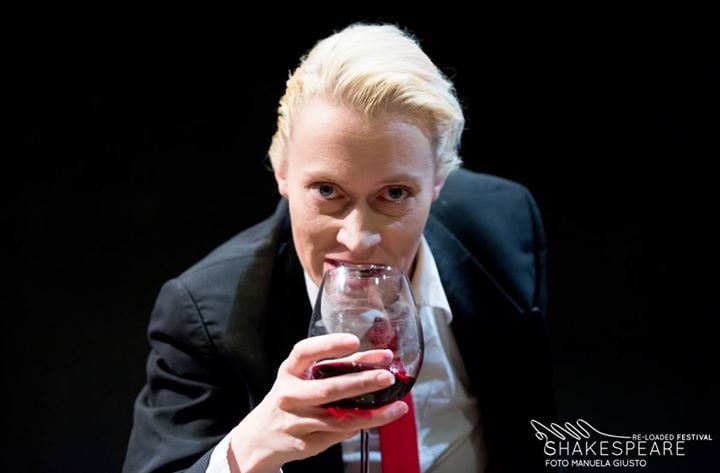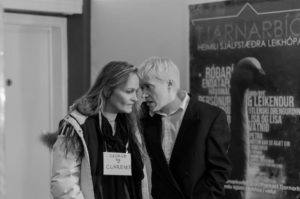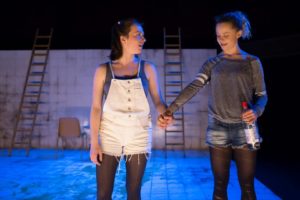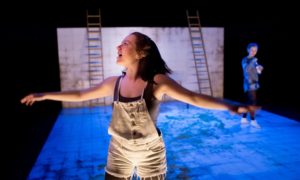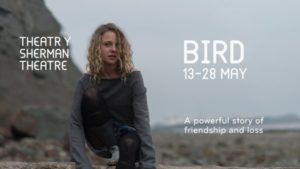It is late but still light in Cardiff Bay. I am rushing back to the foyer to regain my handbag from the cloakroom, when I am stopped by another member of the Black Stuff audience: what did you think of it? You want me to be totally honest? Yes. Ok, I am hungry and I was bored. Me too, she says, I was watching the audience to see whether it was just me. So was I, I say.
Why bored when there is energy – this unrelenting, grubby energy in the piece?
The manic desire of 4 performers to activate their audience in the filthy black, broken building of Cardiff’s coal black past begins with the usual introduction of the heroic industrial past, the rise of hateful capitalism and the loss of jobs. A facile, lazy, predictable position.
A loose plot of past characters all real and one still living, uncomfortably atop a wonderful, surreal story of miners and hangmen.
Hard to understand, hard to hear the words, hard to follow the perambulatory plot through the rotting rooms. Gratuitous fire and semi-nakedness with a moment of light with Anna Karenina and a cricket match in a corridor over rail tracks. Oh and some nervous amusement over the dining table. Smashing. Grim.
Let me just run over a couple of scenes.
One. A big dark room smelling of damp is lit by a flame at a far corner. 3 men mine lumps of dusty coal from a thick layer of the black stuff neatly carpeting the floor around us. They writhe in it, dance in it, they move it across the space like rocks in Bent. Their movements are assured; working hard and fast, balletic and athletic around our living, Spanish centrepiece and she is glorious in her command.
Another. That dining room with that dining table. Our coal streaked men of nations sit around a polished surface in high backed chairs. They philosophise. They are served soup slopped into their bowls by their opinionated lady. They eat and talk and slaver and drool their words and food dripping over them. Bowls are there for smashing.
So much effort goes into this production and it feels so cruel to be so cold about such a hot topic. But, sometimes theatre can be too clever, sometimes effects override a good story. The location is impressive, the ideas are sound and the performers are exciting – they don’t need to try so hard to impress us for so long. It is exhausting. It becomes monotonous, dull in its efforts to share that energy.
After the finale of rolling and crashing big blue drums around a collapsing ballroom of an office, the applause from the people backed against the walls is long and loud.
In the foyer, I ask another person what she thought: I am reeling, she said, it gave me so much to think about. She is happy and fulfilled by her experience. She is probably not alone. Not bored at all.
Theatre / performance art/dance
Black Stuff
Wales Millennium Centre, Cory building
Tue 17 May 2016 to Sat 28 May 2016
Directed by Paul Davies
Movement Director: Catherine Bennett
Design: Cadi Lane
Lighting Design: Ben Stimpson
Production Manager: Dan Taylor
Performers: Rhys McLellan; Neal McWilliams; Barbara Sarmiento Araña; Aled Bidder
Video: Erin Rickard
Original Sound: Adam Howell
Thanks to Betty Rae Watkins, Sarah Pace and the Josef Herman Art Foundation Cymru – See more at: http://www.volcanotheatre.co.uk/whats-on/black-stuff#sthash.45gW7ytc.dpuf

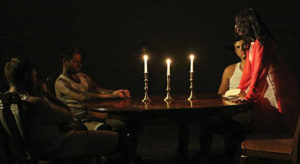
 (3 / 5)
(3 / 5)

 (5 / 5)
(5 / 5)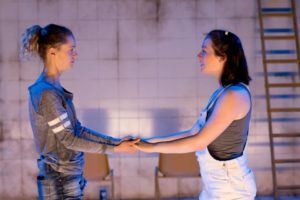
 (4 / 5)
(4 / 5)
